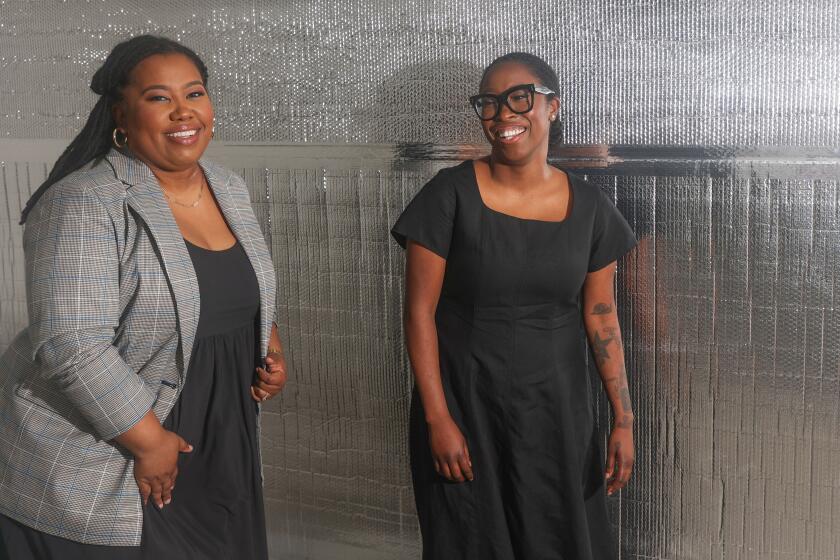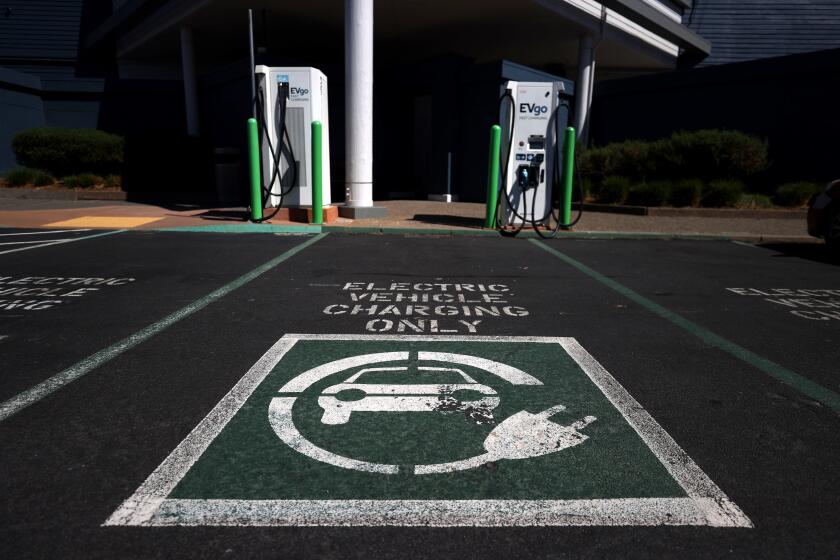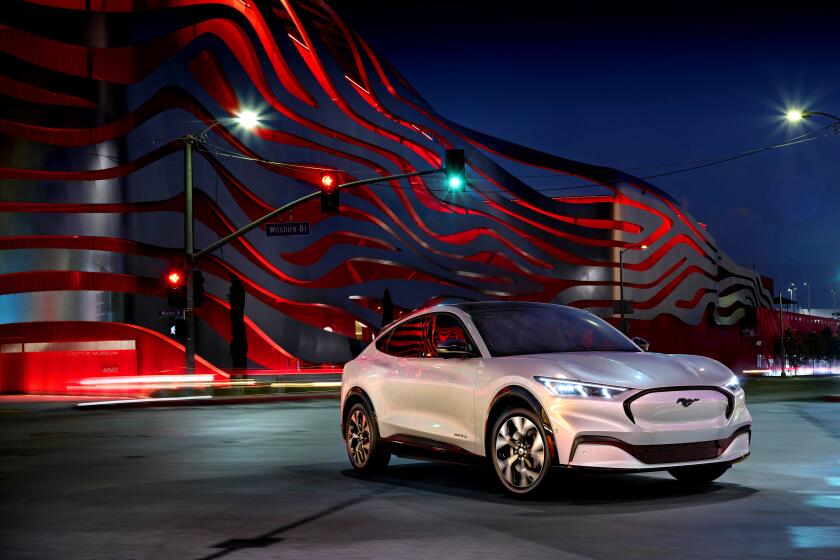Company that specializes in taking a lot off the top
Al Zadeh once hoped to be a doctor, fixing people’s broken bodies and restoring their dreams. Now he’s fulfilling dreams and performing reconstructive surgeries -- on cars, not people.
His first career plan crashed when Zadeh discovered in anatomy lab “that I had a big problem with blood and stuff.” The USC engineering school graduate makes convertibles out of cars the original manufacturers never intended to go topless.
Zadeh has become something of a trendsetter. His company, Newport Convertible Engineering, was making cloth-top New Beetles in 1998, almost two years before Volkswagen came out with its own topless bug. He designed and built the first Chrysler Crossfire convertible and was selling convertible models of the PT Cruiser in 2002, well before Chrysler did its own production version in 2004.
Zadeh’s latest model is a convertible version of Toyota Motor Corp.’s new FJ Cruiser: a rugged ragtop he says is still capable of tough off-road activity when not cruising the coast.
Newport Convertible -- an enterprise whose name evokes Southern California’s golden beaches and white-capped waves -- actually operates out of a concrete tilt-up industrial building in the decidedly inland Orange County city of Placentia.
The name is part of the mystique that creates opportunity for the business.
“There’s a desire among many of us to have something unique. And a convertible, especially a model that the carmakers aren’t mass-producing, is something special,” said Jim Hossack, an industry analyst at market research firm AutoPacific Inc. in Tustin. “If you have money, a convertible like that is a great way to make a statement.”
With 15 employees and $3 million in annual revenue, by Zadeh’s account, Newport Convertible is to all outward signs a profitable business. But it took some doing, and a painful Chapter 7 bankruptcy, to get there.
Zadeh, 48, immigrated to the U.S. in his teens. He has been fascinated since his childhood in Iran with the idea of building elaborate mechanisms that could perform human tasks, and do them better.
After realizing that his dream of being a doctor wasn’t feasible, he turned to USC’s engineering school. There, after studying biomedical and mechanical engineering, he finished with a degree in petroleum engineering.
His plan, he said, was to make his millions early, then set up his own business and turn his talents to other pursuits.
But Zadeh graduated in 1981 just as the industry entered a period of intense competition and falling oil prices, during which petroleum companies trimmed hundreds of thousands of jobs from their payrolls. His job as an exploration engineer was one of them.
“I got laid off in 1983, so I took my savings and thought, ‘What else do I want to do?’ ”
At the time, Zadeh drove a small MG convertible and had grown frustrated with the British sports car and the “horrible design of the top.”
“It leaked everywhere, all the time,” he said. “I wanted to work with cars, and I decided that I could use my engineering background to design a better convertible top.”
To earn money while teaching himself how to do so, Zadeh sold and installed auto body customizing parts. He named the business A&F; Automotive -- for Al and Farida, a sister who helped him out from time to time.
By 1986, Long Beach-based A&F; was out of the custom body parts business and concentrating on doing convertible conversions.
Zadeh’s brother-in-law Matthew Kahnamelli had moved to the U.S. after finishing college in England and became a co-owner and the company’s business and marketing manager. The company changed its name in 1995 when it moved to Placentia.
It took six months to design and build the first convertible, Zadeh said. And it wasn’t an MG but a conversion of a Nissan 240Z sports coupe. Others followed -- initially one-of-a-kind models built on spec, including convertibles made from hardtop Zs as well as Volvo, Lexus, Toyota and Mercedes-Benz models.
Kahnamelli began advertising the company’s work in specialty magazines, such as the Dupont Registry and Robb Report, that are aimed at wealthy auto enthusiasts. Newport Convertible started building to order for people who wanted something a bit different from what their neighbors were driving.
“That’s a market that’s big enough to keep them going a long time,” said Roy Adler, a car enthusiast and Pepperdine University marketing professor who specializes in consumer psychology.
By the late 1990s, Zadeh had started converting popular production cars, deciding that the future lay in having established auto dealers sell his work rather than depending on individual customers to come in with customizing requests.
Chris Collins, manager and co-owner of the recently opened Urban Chrysler-Jeep-Dodge in Foothill Ranch, said he had already sold one of Zadeh’s convertible Chrysler 300s and had just signed on to sell Newport Convertible’s Dodge Charger version as well.
“The quality of their work is great,” he said, “and these kinds of cars really bring people in.”
The cars typically run $10,000 to $15,000 above the regular hardtop version’s sticker price, though one notable job penciled out at $250,000. (That was to turn a Mercedes Benz S-Class sedan into a wheelchair-friendly two-door convertible.)
Making a convertible out of a hardtop involves much more than chopping off the steel roof and designing a folding mechanism for the cloth top. Removing the steel top robs a car of a tremendous amount of structural rigidity that must be restored before the resulting soft-top can be deemed drivable.
“We did a lot of learning on the job about that,” Zadeh said. “I was able to use my engineering training, and I used some of the same methods that are used to make bridges structurally sound.”
In reviews of Newport Convertibles’ work, enthusiast magazines including Car and Driver and Motor Trend have found the cars to be the equal of factory-built convertibles in rigidity and roadworthiness.
Zadeh’s latest inspiration was to replace the steel top of Toyota’s FJ Cruiser sport utility vehicle with a one-touch, automated canvas convertible roof. The prototype was unveiled in November at the Specialty Equipment Market Assn. trade show in Las Vegas and drew lots of attention at the recent Los Angeles Auto Show.
The project earned Zadeh the opportunity to pitch his design and engineering services to Toyota Motor Sales USA, the Torrance-based U.S. arm of the Japanese automotive giant.
A Toyota spokesman said the company had not pursued things further. But Zadeh said he remained hopeful that the electronically controlled convertible system he developed for the FJ Cruiser would help move his business into its next stage.
“I’d like, ultimately, to stop building specialty cars in small numbers and to become a design and engineering consultant working with all the automotive companies to help them develop convertible models,” he said.
Automakers tend to be leery of convertibles: They are difficult to engineer, are expensive to make and sell in small numbers in a business that needs big volume to make development costs pay off.
That, Zadeh said, is where he can step in.
It’s a big dream, but Zadeh, who preaches the glories of American capitalism and opportunity, says dreams are necessary to succeed in business.
“When you don’t have goals, if you are only satisfied with what you are doing, then you get stale,” he said
Zadeh cautions, though, that entrepreneurs must learn to pace their dreams.
In 1994, operating on faith that preliminary talks with a major automaker would turn his little business into a big one, Zadeh borrowed money for new equipment and by early 1995 had expanded himself -- right into U.S. Bankruptcy Court.
“The deal never materialized, and I learned that dreams are good but you have to be practical too,” he said. “I don’t act so fast now. I make sure I have things in writing before I move ahead.”
Zadeh’s business has been moving steadily forward ever since, though at a slower pace, he said.
And if the Toyota deal doesn’t happen?
“We’re sending out mailers to GM dealers next month to get some interested in selling our latest,” co-owner Kahnamelli said. “It’s a convertible Hummer H3.”
*



